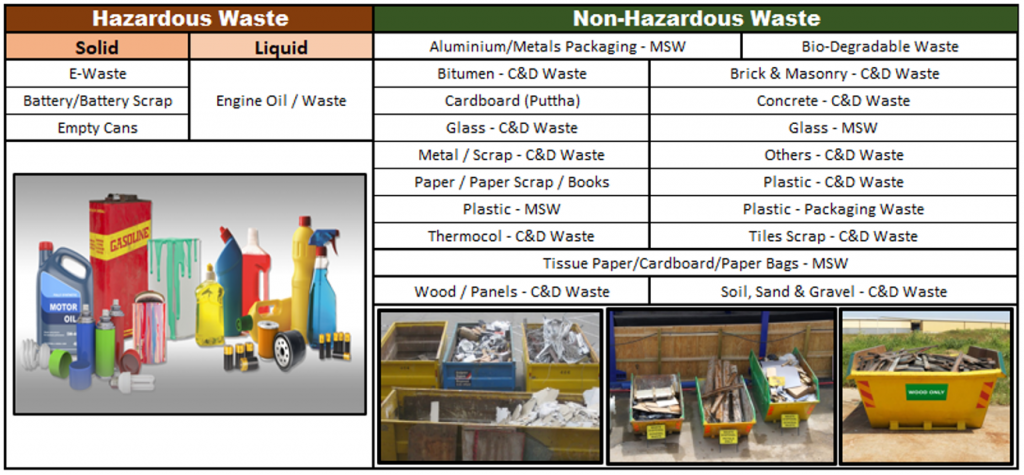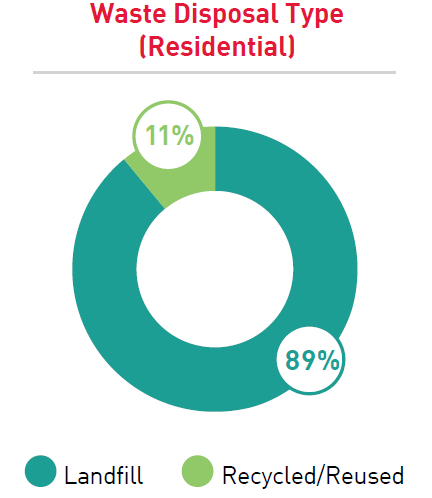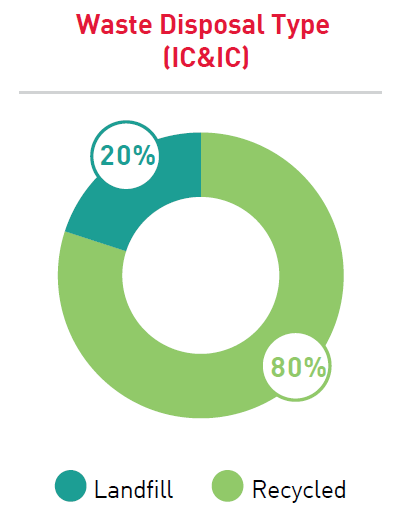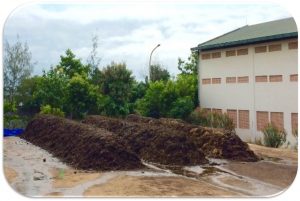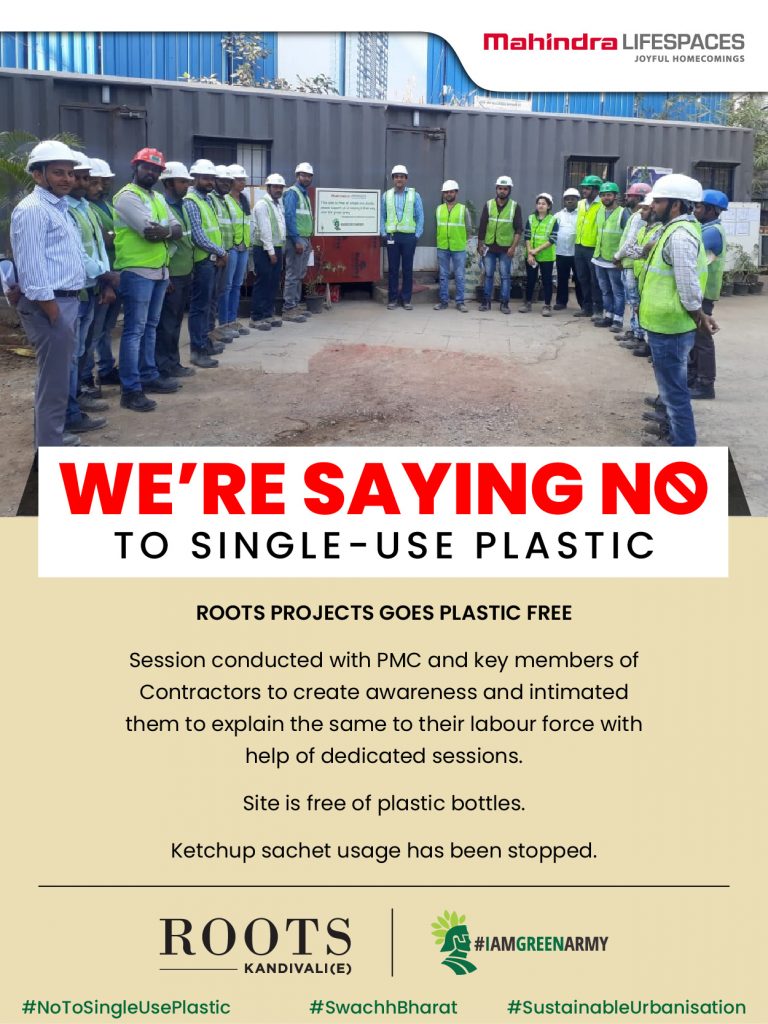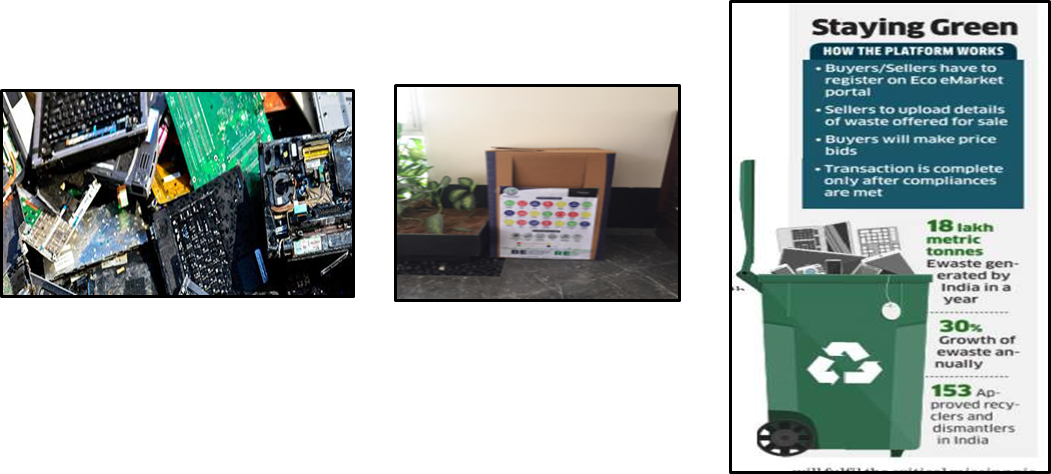
How we are making change
1. Supporting and Creating Circularity in real estate
Indian real estate sector accounts for 20% of annual raw material consumption in the country. Aspirations for secure, safe, and sustained employment opportunities has seen an increase in demand for housing solutions in cities. The desire to own a property is exerting pressure on limited stock on natural resources, making resource efficiency the need of the hour for the economic, social, and environmental sustainability. We are cognisant of the need to integrate optimal material use and waste management into our construction activities. Sustainable habitat will be a pipe dream if we do not focus on waste. In this pursuit, we have initiated integrating principles of circularity in our operations.Buildings, typically designed on a ‘take-make-dispose’ model, are responsible for more than one-third of global resource consumption. This approach of construction also results in significant generation of construction and demolition (C&D) waste.
With stakeholders becoming aware of the environmental costs of construction, Mahindra Lifespaces has made efforts to transition to circular economy. It is based on three principles of designing out waste and pollution, keeping products and materials in use, and regenerating natural systems. Such interventions also have an impact on our emission reduction.
These measures are also aligned to the 'Sustainable Development Goals (SDG)' on,
At Mahindra Lifespaces, we manage waste produced during construction, by eliminating and minimising waste, reusing, recycling, and safe disposal at designated sites. We also manage the domestic waste generated by our customers in the use phase. This gives us the opportunity to adopt best practices such as converting biodegradable waste into biofuels and compost, and inculcate behaviours related to sustainable waste management among our customers.
Read more about Mahindra Lifespaces waste management efforts (hyperlink to page 5)
2. Our Commitment
As part of our ‘Sustainability 2.0’ journey, we aim to achieve zero waste to landfill for our sites.
3. Waste Management during the Pandemic
COVID has resulted in increased use of disposable masks and PPE. However, we procured reusable masks and PPE for workers resulting in no COVID-related waste at our residential locations. We also laid down the COVID waste management guidelines at our sites and offices. We saw influx of COVID-related waste in our cities, and worked with our IC & IC customers to handhold them on various waste related sensitisation and connected them to right vendors for waste management.
Design Stage
1. Design for better waste management
Innovative techniques to reduce, reuse and recycle waste are incorporated right at the design stage for our Residential & IC & IC projects, which influences the operational efficiency of the waste collection, segregation, treatment within the premises, cost of servicing the waste management activities, and the diversion rate. Estimations on the amount of waste generated for different waste types are done based on the occupancy of the designed project. Various available waste treatment & disposal mechanisms for these waste types are analyzed within the project area followed by Waste management vendor selection based on the wide range of treatment offerings on different types of waste & the space requirement within the premises.
Construction Stage
The construction sector is responsible for generation of enormous quantities of construction and demolition (C&D) waste in India, and this trend is likely to further increase in coming years. Management of this waste is a challenge, as most of the waste is disposed, either in designated landfills/ dump sites or often in unauthorized places, causing a host of safety and environmental problems. We are conscious of the need to use alternative materials for construction that can curtail the use of virgin materials in order to reduce environmental footprint in terms of energy consumption, pollution and waste disposal.
At Mahindra Lifespaces, we ensure responsible management of waste during construction. Our idea of circularity in construction is based on the business model of using materials for as long as possible, while reducing waste through reuse, recycling, and upcycling and safe disposal at designated sites. We also manage the domestic waste generated by our customers at Integrated cities and Industrial clusters. The biodegradable waste generated is converted into biofuels and compost.
With the objective of identifying measures for reuse and recycling of waste during construction, we have developed a detailed inventory of waste at all the project locations.
- Our green building strategies guides us in the use of materials with recycled content and post-consumer recycled materials
- With enhanced resource efficiency through recycling at our industrial clusters, Mahindra World City Chennai became the first integrated city in India to be certified as Zero Waste to Landfill. We are working towards achieving the same for Mahindra World City, Jaipur.
At least 75% of our construction waste is diverted from landfills. Under our construction waste management plan, we track all recyclable waste and ensure it is collected and segregated at a demarcated location.
1. Waste Management Initiatives at Mahindra Lifespaces during construction
We also use our patented ‘Fly ash brick with low thermal conductivity’, in our projects. This has allowed us to incorporate recycled waste as an input in our raw materials to the extent of 35%. However, our primary focus remains at avoiding wastage and reuse of materials through proper handling, and skill workmanship.
2. Our Waste Inventory
3. Our Waste Inventory - 2020-21
We, at Mahindra Lifespaces, employ innovative techniques to manage waste generated during three stages of a project namely; design, constructions and occupancy. We minimise waste production by reusing, recycling, and safe disposal at designated sites. At Mahindra World City Jaipur, construction and demolition (C&D) material debris and scrap were consolidated and segregated for re-use in temporary fencing and road barricades. At other sites, we have identified opportunities to convert biodegradable waste generated into biofuels and compost and bring about a behavioural change towards waste management among our customers.
Hazardous waste generation in the residential segment has increased due to reporting sludge waste, battery related waste & empty cans under appropriate waste category this year. All the other residential sites have reported negligible hazardous waste. In the residential segment, 3 of our project sites recycled or reused 100% of the waste generated thereby diverting the complete waste away from landfill.
In the IC&IC segment, we continued our efforts to achieve the target of Zero Waste to Landfill for all the sites. Mahindra World City Chennai portrayed an exemplary example of circularity with 100% waste being diverted away from the Landfill and being recycled/reused.
Occupancy Stage
Waste Management in Customer Homes
Our strategy on waste management doesn't stop with construction stage, we ensure to maintain circularity throughout the lifecycle of the products that we build. All our buildings are equipped with colour coded bins - red, green and blue to collect recyclable waste such as inorganic waste/hazardous waste, bio-degradable waste/organic waste and paper/plastic/cardboard waste respectively. All the treated biodegradable waste is converted into manure and is used for landscaping. Bio-degradable waste is treated on the premises through provision of organic waste converter with proper training on its usage provided to our customers.
Zero Waste to Landfill (ZWL) at Mahindra World City (MWC) Chennai
In the IC & IC segment, we continue our efforts to achieve the target of Zero Waste to Landfill for all the sites. We identified opportunities to convert biodegradable waste generated into biofuels and compost and bring about a behavioural change towards waste management among our customers.
Mahindra World City Chennai portrayed an exemplary example of circularity with 100% waste being diverted away from the Landfill and being recycled/reused.
What did Mahindra World City, Chennai do about its waste?
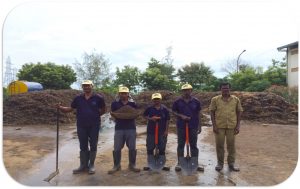
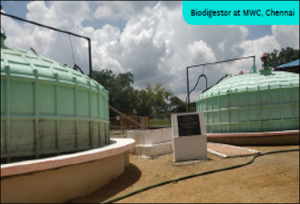
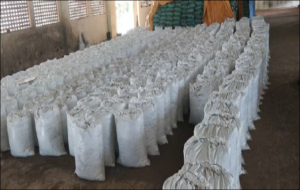
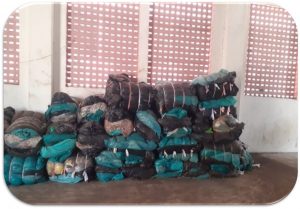
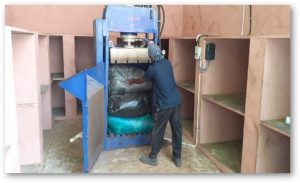
Strategy to ensure 100% waste diversion
Impact
Single use plastic free sites
‘Single use plastic free site campaign’ organized for our staff members and workers. This platform is used to educate our workers about the 3R principle (Reduce, Reuse, Recycle) and importance of waste management. To put this knowledge to practice, our workers are encouraged to collect and segregate plastic waste on site and from neighbouring areas. A quiz was also conducted to test the awareness about plastic among workers. All participants were recognised and were given plants as a token of appreciation.
In February 2020, we achieved single use plastic free status across all locations by prohibiting the use of plastic bottles, cups and plates, and cutlery. We have also incorporated the ban on single use plastic in our event guidelines as well our customer connect events. As a result, we avoided over 800 kg of plastic across locations. We continue to intensify the campaign to cover customer gifting as well. At Mahindra World City, Chennai and Jaipur we are tracking single use plastic items in the waste stream and are working with customers to enforce single use plastic ban in respective workplaces.
Concrete Plastic Roads
We at Mahindra are constantly looking at innovative and productive ways to utilise waste. Flimsy, single-use items like shopping bags and foam packaging are the ideal raw material for inclusion in plastic-concrete road. They are difficult to recycle, hog space in garbage dumps, and clog city drains. Concrete plastic roads serve as a ready-made landfill for such trash. In our 'Happinest Palghar' project, 15% of sand used in concrete mix was replaced with shredded plastic waste. In this pilot initiative, 140 kg of plastic waste was used to substitute sand. Not only was the plastic-concrete mix economical, it also had a higher compressive strength than the conventional mix. Switching from asphalt to plastic roads would also reduce carbon dioxide emissions when compared to traditional road construction. Such roads also have substantially higher water resistance than conventional asphalt or bitumen-based roads, abrasion resistance, and more durable. Through this initiative, we seek to promote circularity in plastic waste.
Responsible e-waste disposal
Mahindra Lifespaces, prior to being classified as a bulk consumer, as per the E-Waste (Management) Rules, 2016, undertook the task for responsible disposal of e-waste. We tied up with Eco e-Market, which handled and recycled our e-waste. Approximately 344 kgs of e-waste was generated and collected from the locations at Pune, Mumbai and Chakala. The waste led to the recycling of components including 99% metals, 80% glass and 99% plastic. 1% mercury and lead components were disposed-off in a controlled landfill and as per MOEF/Chemical and Fertiliser policy. The recycling of e-waste helped avoid 879.34 kgCO2e emissions, 12,057.3 l of water and 424.8 l energy equivalent of fuel through recycling of waste & thereby avoided 5,904.5 m3 of landfilling.
















